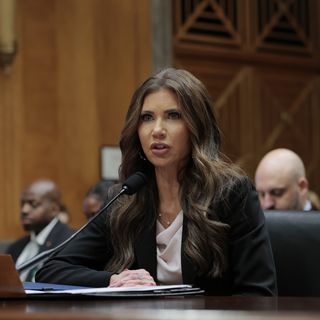Reading view
Boogie Cousins Says Cooper Flagg is Not No 1 Overall Pick
James Harden Expected to Opt Out of Clippers Contract: Report
Google cofounder Sergey Brin shares why he's back at the company 'pretty much every day now' to work on AI
Kelly Sullivan/Getty Images
- Google cofounder Sergey Brin just made a surprise appearance at the company's I/O conference.
- Brin said he's back at Google "pretty much every day now," where he's been developing AI products.
- Brin also spoke about why Google Glass failed, though he's bullish about Google's new XR glasses.
Google cofounder Sergey Brin made a surprise appearance onstage at the company's flagship I/O developer conference Tuesday, where he explained why he's returned to the tech giant and what he's learned from the failure of Google Glass over a decade ago.
It's the latest sign that Google is going hardcore on AI. Brin has been back at Google to help develop its AI products since 2023 as the search giant races against OpenAI's ChatGPT, and he shared about what he's been up to since returning to the trenches.
Brin wasn't expected to speak at the talk, which Google billed solely as an interview of its DeepMind CEO Demis Hassabis. He joked, "I torture people like Demis, who is pretty amazing. He tolerated me crashing this fireside."
In the chat with Hassabis, Brin said he comes into Google "pretty much every day now" to chip in on training the latest models from Gemini. It's something that naturally interests him, the famously technical co-founder said.
"I tend to be pretty deep in the technical details," Brin said. "And that's a luxury I really enjoy, fortunately, because guys like Demis are minding the shop. And that's just where my scientific interest is."
Since returning to Google, Brin also attended last year's I/O, where he fielded reporters' questions about AI.
Learning from Google Glass
At the 2012 Google I/O conference, Brin famously demoed a video in which he wore Google Glass while skydiving to show off the tech giant's previous foray into wearables. This year, he also addressed Google Glass, which it stopped selling a decade ago.
At the Tuesday fireside, Brin said Google Glass's failure stemmed partly from his lack of knowledge about manufacturing and supply chains.
"I just didn't know anything about consumer electronic supply chains, really, and how hard it would be to build that and have it at a reasonable price point," he said.
Brin is far more bullish on Google's latest wearables venture: "XR," or Extended Reality, glasses. At the fireside chat, he said he thinks AI is far more capable now for such a product.
Business Insider was able to snap a picture of the normally reclusive billionaire trying the XR glasses on before the fireside chat, too:
Charles Rollet / Business Insider
Elon Musk says he isn't ruling out merging xAI and Tesla
Dado Ruvic/REUTERS
- Elon Musk said it's "not out of the question" to merge his AI startup with Tesla if shareholders approve.
- xAI, which Musk founded in 2023, acquired X in March in an all-stock purchase.
- Tesla shares rose 0.5% but dipped in after-hours Tuesday, remaining around 10% down since January 2.
Elon Musk said on Tuesday that he isn't ruling out merging his AI startup with Tesla.
"Well, I guess anything is possible," Musk told CNBC show host David Faber in a two-part interview, when asked whether Musk would ever consider merging xAI into Tesla as a way to gain more control over the EV company.
"There are no plans to do so," Musk said. "It's not out of the question, but obviously it would require Tesla shareholder support."
Musk launched xAI as a startup in 2023. The company acquired X, his social platform formerly known as Twitter, in an all-stock transaction valuing xAI at $80 billion and X at $33 billion in March. The AI chatbot Grok was also introduced to X and trained in part on the social media platform's data.
Elon Musk said in the Tuesday interview that Tesla and xAI will continue sourcing AI chips from Nvidia and AMD. He told Faber that xAI has deployed 200,000 GPUs at its Colossus facility in Memphis and plans a 1 million-GPU site nearby, but he did not disclose any specific chip orders.
Based on documents previously viewed by Business Insider, xAI is also spending at least $400 million on building a supercomputer in Memphis, and may encounter difficulties because the city's power grid might not yet be capable of powering a project of that magnitude.
Following the CNBC appearance, Tesla shares saw a 0.5% boost at market closing time compared to the day before, but dipped slightly in after-hours trading.
Though Tesla stocks have been on the rise in May since Musk said he would leave DOGE, the EV company's shares are still at around 10% down compared to where it was on January 2 this year amid struggling Q1 sales and declining confidence in Musk's priorities.
Tesla did not respond to a request for comments.
Lakers Superstar Luka Doncic Reportedly Turning Page With Conditioning Plan
Cardinals' Surprisingly Strong Start Deemed 'Not Real' In Early MLB Playoff Outlook
Biden camp pushes back against suspicion over cancer diagnosis timing
Former President Biden's team on Tuesday sought to shut down questions over how long they've known about his cancer diagnosis.
The big picture: After previous concerns that the 82-year-old's health issues may have been covered up in the past, Biden's disclosure over the weekend that he has Stage 4 prostate cancer was met with both sympathy and speculation over its timing.
What they're saying: A spokesperson for Biden told Axios in an emailed statement Tuesday evening that the former president's last known prostate-specific antigen (PSA) test was in 2014.
- "Prior to Friday, President Biden had never been diagnosed with prostate cancer," the spokesperson said.
State of play: The U.S. Preventive Services Task Force recommendation on screening for prostate cancer holds that it's an individual choice for men age 55-69 and that it offers a small potential benefit of reducing the chances of death.
- They worry about potential harms of screening, including additional testing, prostate biopsy, over-treatment and complications.
- For those 70 and older, like Biden, they advise against it, saying with moderate certainty that potential benefits don't outweigh expected harms.
Between the lines: Biden was 70 or 71 years old when he had his last PSA, before he had symptoms that led to last Friday's exam. That's within standard guidelines and is not unusual.
- It is noteworthy, however, that he apparently was not tested for it even while he was president.
Context: Biden's personal office announced his diagnosis on Sunday.
- "On Friday, he was diagnosed with prostate cancer, characterized by a Gleason score of 9 (Grade Group 5) with metastasis to the bone," they said.
- Even at that advanced stage, physicians say the condition can be managed, thought not cured.
- He was evaluated last week after doctors found a "small nodule" in his prostate during a routine physical exam.
Go deeper: Biden's cancer diagnosis draws sympathy — and suspicion


"Blatantly defied" court: Lawyers say Trump admin deported immigrants to South Sudan
Immigration attorneys have accused the Trump administration of deporting immigrants from Myanmar and Vietnam to South Sudan in violation of a court order, per a filing Tuesday that's requesting their "immediate return."
The big picture: The attorneys made the filing in a Boston-based federal court to U.S. District Judge Brian Murphy, who's already ruled that sending undocumented immigrants to countries they're not citizens of would "clearly violate" an earlier order against sending people to third countries.
Driving the news: The lawyers said the man from Myanmar, identified as N.M., was delivered a notice in English without an interpreter on Monday, saying he'd be sent to South Sudan, an East African country that the State Department advises U.S. citizens not to travel to due to "continued security threats" that include crime, kidnapping, and armed conflict.
- "N.M. has limited English proficiency," said a San Francisco-based attorney in a Tuesday filing that said she was told after the fact that her client had been "removed" from Texas' Port Isabel Detention Center to South Sudan.
- The emergency filing in the Massachusetts District Court said T.T.P., a national of Vietnam, "appears to have suffered the same fate as N.M." and the lawyers had "information that there were likely at least 10 other" immigrants on the deportation plane to South Sudan.
- The lawyers said this "blatantly defies" the court order prohibiting sending immigrants to third countries and requested the judge block any further such deportations.
- Representatives for the Trump administration did not immediately respond to Axios' request for comment in the evening.
Go deeper: First flight leaves U.S. under Trump's $1000 "self-deport" deal


Carlos Mendoza Provides Update: 'He's Going to be Fine, He's Juan Soto'
Chargers Named Best Fit for $84 Million Pro Bowl Defender in Blockbuster Trade
How to Watch Timberwolves vs Thunder: Live Stream Western Conference Finals Game 1, TV Channel
Schumer blasts Thune for choosing "nuclear option"
Senate Majority Leader John Thune is blazing forward with a controversial move to repeal California's EV mandate — and Democratic Leader Chuck Schumer is warning it will come back to bite him.
Why it matters: Schumer (D-N.Y.) all but threatened to deploy similar strategies to get around opinions by key, nonpartisan rule makers if and when he grabs back control of the chamber.
- "What goes around comes around," Schumer said on Tuesday. He and other Democratic leaders have described the GOP move as a "nuclear option."
- Thune (R-S.D.) accused Democrats of "throwing a tantrum."
Driving the news: The Senate will vote as soon as Wednesday on a Congressional Review Act (CRA) resolution that would overturn California's Clean Air Act waiver, leading to an eventual ban on gas-powered vehicles.
- The Government Accountability Office issued an opinion saying that the waiver is not a rule that cannot be repealed by the CRA. The Senate parliamentarian then agreed with GAO.
- That isn't stopping Republicans.
Zoom in: Key Senate Republican leaders have been discussing the best way to move forward with repealing California's EV policy — and assuring senators with concerns about ignoring the parliamentarian.
- For weeks, GOP Whip John Barrasso (R-Wyo.) assured reporters the Senate would move forward with the CRA, making the case for it on the Senate floor and in an op-ed.
- Senate Rules Chair Mitch McConnell (R-Ky.), a staunch defender of Senate procedure, spoke in favor of using the CRA during a closed-door lunch last week. His voice was particularly influential for some senators on the fence, according to sources familiar.
Between the lines: Republicans argue the California waiver is a unique case, the GAO does not get to decide what rules can be undone and that their action does not count as overruling the parliamentarian.
- "We are not talking about doing anything to erode the institutional character of the Senate," Thune argued on the Senate floor on Tuesday.
- Democrats say Republicans are leaving the door wide open for how the CRA can be interpreted and used in the future — and point to past examples of Republicans asking the GAO to weigh in on the CRA.
- "To go nuclear on something as significant as this, and to do the bidding of the fossil fuel industry, is outrageous," Schumer said on the Senate floor on Tuesday evening.


Biden's deterioration unnerved House Democrats as early as 2023, new book reveals
Some of the first House Democrats to call for former President Biden to drop his reelection bid in 2024 saw firsthand signs of his deterioration as early as 2023, according to a new book by CNN's Jake Tapper and Axios' Alex Thompson.
Why it matters: Many top Democrats, including White House officials, donors and lawmakers, ignored what they were seeing for months or even years. Others, the book says, noticed Biden's shortcomings but kept quiet.
- In the end, it was self-preservation that spurred many Democrats to finally drop the charade and urge Biden to get out of the race after his disastrous presidential debate.
- The book "Original Sin" is based on interviews with more than 200 people, mostly Democratic insiders, with knowledge of the events that unfolded during the final two years of Biden's presidency. Almost all of the interviews took place after the 2024 election.
Driving the news: Thompson and Tapper write that a White House Christmas party in 2023 was a watershed moment for several Democratic lawmakers.
- Rep. Adam Smith (D-Wash.), the ranking member of the House Armed Services Committee, was "stunned" to see Biden "completely out of it" while interacting with guests at the photo line.
- Upon leaving the party, Rep. Seth Moulton (D-Mass.) and his wife, Liz, "remarked on how frail the president looked and how lethargic he seemed compared with the previous December."
Zoom in: For Rep. Mike Quigley (D-Ill.), the book says, the epiphany came even earlier.
- During a trip to Ireland in April 2023, Quigley saw Biden rapidly go from energetic to drained. "This was how his father, Bill, had been before he died," the authors write.
- "Biden, Quigley thought, needed to go to bed for the rest of the day and night. He wasn't merely physically frail; he had lost almost all of his energy. His speech was breathless, soft, weak."
The other side: "There is nothing in this book that shows Joe Biden failed to do his job, as the authors have alleged, nor did they prove their allegation that there was a cover-up or conspiracy," a Biden spokesperson told Axios.
- "Nowhere do they show that our national security was threatened or where the President wasn't otherwise engaged in the important matters of the Presidency. In fact, Joe Biden was an effective President who led our country with empathy and skill."
- Some Democrats have leapt to Biden's defense, with Rep. Jim Clyburn (D-S.C.) saying in a CNN interview that he "never saw anything that allowed me to think that Joe Biden was not able to do the job."
Zoom out: Smith, Moulton and Quigley were among the first House Democrats to call on Biden to withdraw his bid for reelection after his debate with Trump in June 2024.
- But they and other House Democratic colleagues had largely kept quiet up until that point.
- Former Rep. Dean Phillips (D-Minn.), who challenged Biden in the Democratic primary, had "tried to get other Democrats to talk about the president's decline, but no one was willing to say anything publicly," the book says.
- The former congressman is quoted as saying later: "The whale who spouts gets harpooned."
Between the lines: At a debate watch party, one House Democrat who watched the calamity unfold exclaimed to House Democratic caucus chair Pete Aguilar (D-Calif.): "I just lost my job."
- Former House Speaker Nancy Pelosi (D-Calif.) heard from swing-district House Democrats who "were getting polling back that indicated Biden's campaign was going to drag dozens of them down with it," the book says.
- Rep. Bill Foster (D-Ill.) said at a closed-door Democratic caucus meeting: "I lived through the 2010 bloodbath — we lost sixty-three seats. That could happen again."
This story is adapted from the book, "Original Sin: President Biden's Decline, Its Cover-Up, and His Disastrous Choice to Run Again," by CNN's Jake Tapper and Axios' Alex Thompson.


Google turns to Warby Parker to develop smart glasses, competing with Meta's Ray-Bans
- Google announced a partnership with Warby Parker for smart glasses, challenging Meta's Ray-Ban line.
- The collaboration includes an investment of up to $150 million, with up to $75 million toward development.
- Google's Android XR platform includes see-through headsets and glasses that support AR and AI.
Google is taking aim at Meta's Ray-Ban glasses with a version of its own AI eyewear line, styled by Gentle Monster and Warby Parker.
"We want you to be able to wear glasses that match your personal taste," Google's Android XR lead Shahram Izadi said at Google I/O.
The glasses are part of Google's Android XR platform and are a partnership with Samsung, the company announced at its Google I/O developer conference on Tuesday. The platform includes see-through headsets, as well as glasses that support augmented reality and AI.
Google and Warby Parker plan to launch a series of products, with the first line of smart glasses with multimodal AI set to launch after 2025, an announcement from the lifestyle vision brand said. Android XR will also include Project Moohan, the first Android XR headset device, which will come out later this year.
Google has committed up to $150 million to the partnership, with as much as $75 million going toward product development and commercialization costs, and up to $75 million in equity, the announcement said. Warby Parker's stock is up nearly 15% following the news about the collaboration.
At the event, Izadi said the glasses prototypes "are already being used by trusted testers." The Google VP didn't share further details on availability or pricing. While Gentle Monster defines itself as a luxury eyewear brand, Warby Parker is better known for offering stylish but affordable options.
Meta CEO Mark Zuckerberg projected in January that 2025 could be a "defining year" for the brand's Ray-Ban smart glasses, even if it's not a breakthrough.
Meta's Ray-Ban smart glasses, which don't yet include AR capabilities, have become one of the company's few mainstream hardware hits. They allow users to take photos, livestream, and access Meta AI via voice.
During the company's latest earnings call, CEO Mark Zuckerberg said sales of the Ray-Ban Meta glasses had "tripled" over the past year. Meta's Ray Bans cost between $300 and $500.
Later this year, Meta is expected to release a new version of the Ray-Bans with a built-in display, its first step toward augmented reality in a mass-market product. According to Bloomberg, the upcoming model could cost between $1,000 and $1,400.
Meanwhile, Meta is developing a separate, more ambitious line of AR glasses, internally codenamed "Artemis," which it aims to release by 2027. These are distinct from both the Ray-Bans and "Orion," an early prototype Meta unveiled last year as a preview of its AR ambitions.
Google is taking aim at Orion with its own "Project Aura" glasses, part of its broader Android XR platform. Google's Aura glasses include a built-in camera, microphone, speakers, and in-lens display, and they are already being tested.
Google has been exploring the concept of smart glasses for over a decade, and it's had some flops along the way — like Google Glass, which was discontinued in 2023, after launching in 2013. Last year at I/O, Google teased Project Astra, a vision of what Google Assistant could be like if it could hear and see around you. Google CEO Sundar Pichai hinted that Google was "working on prototypes" for the AI assistant that could be glasses.
Google did a live demo of the Project Aura glasses on Tuesday at I/O, showing how users could message friends, make appointments, ask for directions, and take photos. It also demoed a live language translation, which appeared a bit glitchy in the onstage demonstration, but still offered an impressive first look at what the tech could offer.
Google I/O also included a series of other product rollouts and AI updates, including a conversation version of Search called AI Mode, as well as gen-AI media models like Veo 3, and Imagen 4.